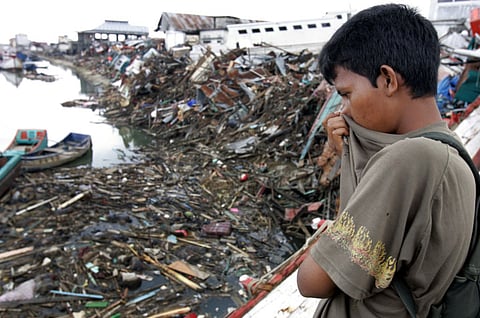2004 tsunami: How Aceh recovered and Sri Lanka declined
The outcome in Aceh is seen as a model for using democracy to achieve peace

The 2004 Boxing Day tsunami that left almost a quarter of a million people dead and led to the world’s largest emergency aid programme had a profound impact on two wars being fought in the region. In Aceh, Indonesia, it contributed to the end of three decades of bloody conflict; in Sri Lanka, the tsunami ultimately led to the deaths of tens of thousands.
In Aceh, the Free Aceh movement (Gam) had been fighting the Indonesian government for a separate state. Gam had retreated to the mountains, following a declaration of martial law in 2002 and the escalation of the war by the Indonesian military. In Sri Lanka, the Liberation Tigers of Tamil Eelam (LTTE), better known as the Tamil Tigers, had similarly been fighting for a separate state in the north of the country. As a result of a 2002 Norway-brokered ceasefire, they managed to establish a semi-autonomous zone in the north of the country, but both the Tamil Tigers and the Sri Lankan government had withdrawn into increasingly hard-line positions.
A dispute over whether tsunami emergency aid funds should be autonomously administered by the Tamil Tigers in their area of control meant that already high levels of distrust were further entrenched. Shaky movement towards a negotiated settlement drifted. By contrast, in Aceh, Gam declared a unilateral ceasefire. There was a sense that assisting the people to rebuild had to take priority. The newly-elected Yudhoyono administration put out feelers towards a possible resolution. While opposing groups in Sri Lanka squabbled and retreated from each other, the international community applied pressure to both Gam and the Indonesian government to find a way forward.
Aceh’s peace talks began in Helsinki in January 2005 and, over the next six months, worked towards a compromise in which Aceh could have a high degree of political and economic autonomy if it remained within Indonesia. Indonesia’s own democratisation was hugely important to this, with the principle of local political representation clinching the deal.
With only animosity in Sri Lanka, the Tamil Tigers made the fatal error of stopping Tamils from voting in the 2005 presidential elections, which saw Mahinda Rajapaksa achieve the slimmest of victories, of 50.29 per cent. Had Tamils voted, the more amenable Ranil Wickremesinghe would likely have won and negotiations could have resumed.
Rajapaksa’s victory ensured that a return to confrontation was all but inevitable. The Tamil Tigers’ own leader, Velupillai Prabhakaran, was equally combative, retaining unrealistic faith in the Tigers’ ability to defeat the numerically superior government forces. As late as 2007, there remained a chance for a negotiated settlement in Sri Lanka, but this ended when government forces resumed their attacks. By early 2009, the Tamil Tigers had been routed, at the cost of some 40,000 lives, with Sri Lanka’s ethnic division continuing as a running sore in the country’s body politic.
In Aceh, meanwhile, post-tsunami rebuilding continued and the province assumed something approximating normalcy for the first time in the modern era. The peace agreement led to local elections, comfortably won by former Gam combatants.
The devastation caused by the tsunami created organisational, economic and political pressure in two deeply troubled regions. In one, these pressures highlighted differences, drove opposing sides apart and ultimately led to a further human catastrophe; in the other it pushed opposing sides to seek compromise.
The outcome in Sri Lanka has since served as a model for how to militarily crush a separatist movement, but remains globally deplored by human rights advocates. The outcome in Aceh has, by contrast, been viewed as a model for using democracy to achieve peace. The 2004 tsunami created two choices for achieving a genuine peace in the areas it affected. Only one of them can be said to have been successful.
— Guardian News & Media Ltd
Deakin University’s professor Damien Kingsbury was adviser to Gam in the 2005 Aceh peace talks and later worked with the Tamil Tigers on the failed attempt to achieve a negotiated settlement.



